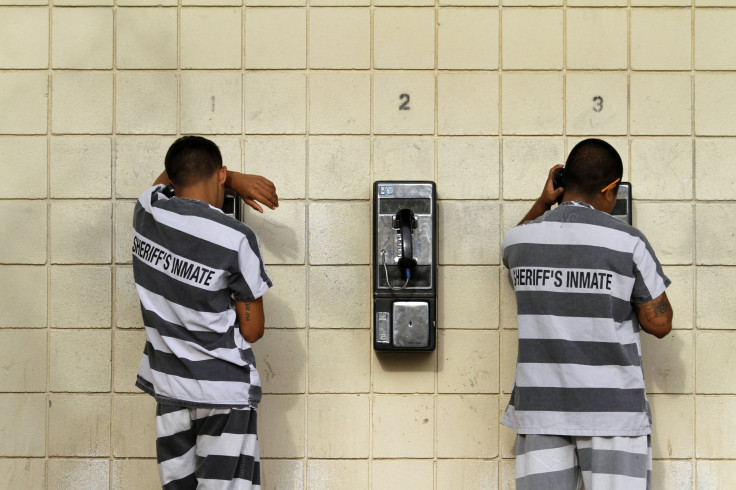Why Prison Phone Rates Keep Going Up Even Though The FCC Regulated Them

Families of prisoners in the U.S. pay as much as $1 a minute to talk to their loved ones behind bars, which is why the Federal Communications Commission stepped in last fall to regulate the industry, which is controlled by a few private firms. And yet families expecting financial relief got a surprise in June: Their rates went up, again.
“It’s salt in the wound,” said Connie Pratt, a 63-year-old woman from Chico, California, whose 33-year-old son is incarcerated in Northern California. Pratt, who lives on a $900 monthly disability check, says she had hoped the FCC action would lower the cost of talking to her son. Instead, she found that on June 20 — the day prices were supposed to go down — the bill for a 15-minute phone call to her son had increased from $7.20 to $9.77.
So what happened?
For America’s 2.2 million inmates, all communication with the outside world is outsourced to private firms. In some cases, a 15-minute conversation with an inmate can cost upwards of $15. The high prices were largely due to monopoly contracts, revenue-sharing deals with local sheriffs, and little oversight.
“In my 16 years as a regulator, this is the clearest, most egregious case of market failure I have seen,” said Mignon Clyburn, a federal regulator at the FCC who championed the reforms. In October 2015, the FCC voted to implement so-called “rate caps” that companies were allowed to charge inmates and their families.
However, while the FCC implemented rate caps on interstate calls, a federal court stayed a rate cap on local ones. In other words, if an inmate makes a call from California to Nevada, the price would be regulated and subject to the cap. But a phone call from within California can be priced however the technology provider and local sheriff see fit.
Now, it appears the biggest prison calling firm, Securus Technologies, has raised intrastate rates to make up for lost revenue. This rebalancing, writes Paul Wright of the Human Rights Defense Center (HRDC), has the “net result of higher costs to prisoners’ family members.”
Last week, the HRDC, an inmate advocacy group, filed a complaint to the FCC about the increase. In it, the group notes that several customers around the country are reporting price increases from Dallas-based Securus Technologies, a private firm that told the International Business Times it booked $531 million in gross revenue in 2015.
At Weld County Jail in Greeley, Colorado, for instance, rates went up 52 percent for a local call. And at a jail in Holdenville, Oklahoma, rates recently rose 43 percent in just 24 hours — from $4.03 on June 19 to $5.75 on June 20. Both jails have contracts with Securus. Right now, it’s unclear how many other jails and prisons have raised their prices.
Rick Smith, chief executive of Securus Technologies, defended the change in an email and pointed the finger toward the FCC. Smith argued that because the FCC eliminated fees, set rates below their costs, and did not ban commission payments (i.e. revenue sharing with sheriffs an prison officials) the company “had to increase rates as long as we received facility approval in order to stay neutral financially.”

“Bottom line,” Smith wrote, “the lower rates that were highly publicized never went into effect because the FCC failed to do their job and tried to set rates below our cost. There are no rate caps on intrastate and local calls, only on interstate calls. I understand that inmates and families are upset that rates didn’t decrease, it’s the FCC’s fault.”
Wright, the inmate advocate, conceded what Securus is doing isn't illegal. “While Securus may not be violating the law ... there is no question that they are not only violating the spirit of the Commission’s Order, but doing so in a blatant manner that indicates their contempt for the FCC’s reforms and authority,” Wright wrote in his official complaint.
When a customer emailed a Securus to complain, the company responded: “Due to an order by the FCC, effective June 20th certain fees related to inmate calling will be reduced or eliminated. As a result, you may see modifications and rebalancing of calling rates at that time to offset fees that have been eliminated or reduced.”
This offsetting, however, has real-life impacts.
For Connie Pratt, maintaining a line of communication with her son, who she says suffers from severe anxiety, is necessary to keep up his mental health. She says she spends about $200 per month on phone calls — more than 20 percent of her total monthly income — to keep in touch with him. Now that prices have gone up, she says it’ll be even more difficult to speak with him on a regular basis.
“The whole prison experience is dehumanizing,” Pratt says. “They’re treated so badly that they’re not going to come out better.”
© Copyright IBTimes 2025. All rights reserved.






















